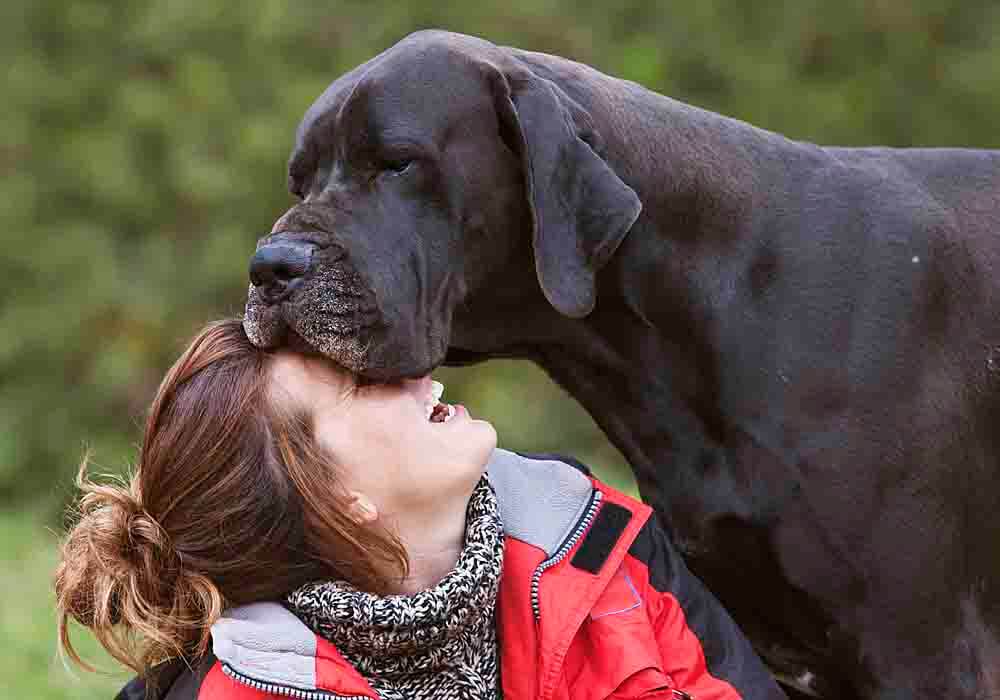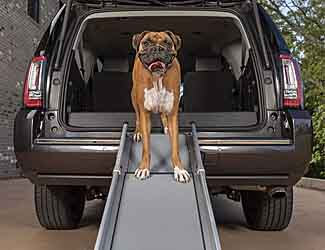How to Raise a Healthy Great Dane
7 Helpful Tips For A Great Start
by Ken Alden
With all breeds of dogs that are welcomed into our homes, we want the very best for them. If you have a Great Dane puppy or are thinking of getting one, you’ve probably started asking a million questions. One of those questions is most likely on how to raise a healthy Great Dane.
The key to raising a healthy Great Dane is monitored feedings, exercise, plenty of bonding, and early training. Great Danes are known for their size and their health problems. They also have a very low average life expectancy, so it’s important to maintain their health for as long as possible.
Let’s take a closer look at the Great Dane and the health concerns they can develop before jumping into how to keep them at their healthiest. Read More Below...
Pro-tip: Ever try lifting a Great Dane? Their weight can hurt not only your back but their joints when they hop down from cars, sofas or even your bed. To protect your back and theirs check out the best Mastiff ramps on Amazon.com now.

Great Dane Health Concerns
Great Danes are some of the largest dogs out there. Being a large dog means that the Great Dane breed is predisposed to a large number of health concerns. It also means that they have a very short average life expectancy of only six years. However, they can live to be 7 to 10 years old.
- Hip
dysplasia - This is a common bone disorder that many large dogs suffer
from. Typically, the dog can be born with it, but it isn’t known until the dog
reaches its mature age. Exercise, weight, and excessive growth can make the condition worse.
- Hypothyroidism - This disease causes
an underactive
thyroid. This means that the
functions of your Great Dane’s body will slowly start to shut down.
- Panosteitis - Panosteitis is
inflammation of the bones in the rear legs of the Great Dane. This is typically
the outer
bone of one or more long bones in the dog’s legs.
It’s very painful for the dog and can impair their ability to walk.
- Bloat - This deadly condition
can come on fast and without warning. It’s common in large dogs and can kill
them quickly. It can be caused by many different things, such as eating too
much too quickly, or too much water. The symptoms for this include a distended stomach and retching without
vomiting.
- Wobbler syndrome - This is a nerve
disease that affects the neck
and is common in large dogs. What occurs is pressure on the neck's nerves,
which results in pain and other problems with the nervous system. This can
typically be diagnosed in dogs before they turn three years old, but it can
happen at an older age.
- Bone
cancer - Cancer is a disease that can be found in all breeds of dogs,
but large dogs over 80 pounds can be more susceptible to it. There is genetic
testing available to see if the dog is likely to develop it.
- Dilated cardiomyopathy - Another common health concern for Great Danes, this disease affects the heart. What happens is the heart is enlarged, the muscles thin over time, and then the heart eventually fails. Symptoms include slower movements, cold paws, coughing, and labored breathing.
Now that you know a little about the health concerns your Great
Dane might face. Let’s look at the best ways to keep your Great Dane healthy.
There are many ways you can go about making these suggestions.
Learn More...
Health Issues Known To Great Danes: Just what are their risks? This article of ours explains things to watch for.
Great Dane Lumps And Bumps: What are they? Should I be concerned?
Care Guide For Great Danes: Everything from A-Z you'll need to know.
Pro-tip: Great Dane anxiety, aggression, destructive chewing, jumping up, fearfulness, and other behaviors can be controlled with the right training program.
Here’s a great course that
addresses these issues along with many other dog training basics: Check it out now!
7 Tips For A Healthy Great Dane...
1. Find a Specialized Veterinarian
Your Great Dane is predisposed to getting a wide variety of health issues. The best thing you can do for your dog's health is to find a vet that can handle the variety.
You’ll want to look for someone who can easily spot heart,
joint, and stomach problems in your Great Dane. It’s okay to shop around when
it comes to the vet that will take care of your dog.
2. Monitor Your Great Dane’s Feeding
Since Great Danes are such large dogs, they are more prone to getting a disease called bloat. This is a deadly disease that can come on suddenly and is fatal to dogs.
Because of this, you’ll want to make sure you are monitoring how
much your Dane is eating
every day. Make sure they
aren’t eating too much or too quickly. It’s suggested that you feed your Great
Dane multiple times a day in small portions.
3. Make Sure They’re Getting Their Exercise
You want to give your Great Dane plenty of exercise, but not too much. Because of their risk for developing bone-related problems, you need to make sure they’re working out but aren’t overdoing it.
Give them at least half an
hour outside every day. This can
be in the form of a brisk walk, or a light jog should be enough to keep their
bodies healthy. If you aren’t sure how much exercise to give your Dane, talk to
your vet. They can help you come up with the perfect plan just for your dog.
4. Spend Plenty of Time With Your Great Dane
Great Danes are very sensitive animals. They thrive when they are with the family they love. They can also develop pretty severe separation anxiety. They don’t do well with extended periods of time outside, living in a doghouse. They’ll be much healthier and happier when they can spend time with you.
Anxiety can actually be fatal to your Great Dane. It can increase their risk of getting bloat, which, as mentioned earlier, can be deadly to them.
Pro-tip: Great Dane's (and their owners) love dog crates…and for good reasons. Crates keep dogs from mischief while you're away, are perfect for house training, for traveling by car, and provide the dog a place to de-stress. Check out the best Mastiff crates on Amazon.com now.
5. Start Training Them As Soon as Possible
Training should begin the moment you bring your Great Dane home. Dogs do much better when they have a set routine and rules to follow. Because of how big they get, training them as soon as possible prevents them from hurting themselves.
Since Great Danes are so sensitive, they don’t
respond well to harsh corrections or punishments. They’ll do much better if you
use treats
and positive praise when training them.
6. Socialize Your Great Dane Early
Even though Great Danes can be loveable, they’re still capable of hurting people if they aren’t used to being around them. They probably wouldn’t even mean to. They’re just so big that it’s possible to knock over a full-grown human without meaning to.
Introducing them to new people from a young age will help them understand how to behave around others. This will help them develop those people skills needed to be around children and assures people they aren’t aggressive.
It also helps prevent your Dane from developing social anxiety. As mentioned before, anxiety can cause a number of other health concerns. Socializing them by exposing your dog to new people will help ease their nerves.
7. Get Your Dane Used to the Car
As with social anxiety, dogs can be pretty anxious about riding in cars. Great Danes are no exception. Get your Dane used to the car as soon as possible.
Take your dog on as many car rides as possible
to get them accustomed to the strange
environment. Take their favorite
toy or a blanket they love with them, so they know it isn’t a scary experience.
How To Raise A Healthy Great Dane...Summary
Great Danes are a loveable breed of dogs that come with a number of health concerns. However, you can prevent those issues by giving them a prolonged healthy life. Hopefully, this article has given you the information you need for
Return to the top of this How To Raise A Healthy Great Dane page

About the Author...
Ken Alden, a dedicated Mastiff owner for over eight years, is acclaimed for his expertise in care, grooming, and training. Read more About Me and my dog Shadow.
- Mastiff Guide Home ›
- Great Danes ›
- How To Raise A Healthy Great Dane








